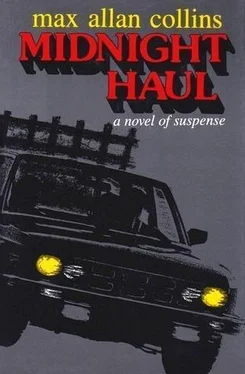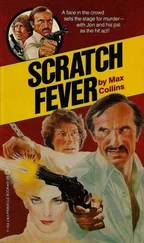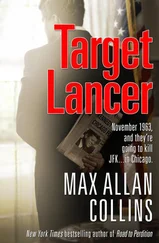He lowered his head. His shoulders slumped. He sobbed. Loud. Then soft. In some small compartment in his mind, the impartial observer in him sat and recorded it all, seeing it as if from outside, as if this were an experiment he were part of, or perhaps himself conducting, thinking: so this is despair. This is how despair feels. It isn’t just a word .
He tried to think of what Mary Beth’s face looked like but he couldn’t bring the image into focus; couldn’t exactly remember. He couldn’t find her voice, either. And Boone. He tried to see Boone in his mind not in a coma but couldn’t. He couldn’t. He tried to remember what it was like not to be in this drum. He felt cold. He hugged his arms to himself. His chin touched his chest.
He slept.
He woke.
He was in a hospital: he could smell it around him. He was in a hospital bed. The sheets felt cool. He felt a little groggy. He ached a little. He looked at his hands: they were bandaged.
“Good morning,” a voice said.
Crane turned his head slowly and looked at the man seated to his right, near his bed: a guy about thirty with thinning brown hair and gray-tinted glasses; he had on a tan sport jacket with a solid blue tie loose at the neck. He’d been reading a newspaper, waiting for Crane to come around, apparently.
“What hospital is this?” Crane asked. His tongue felt thick.
“Princeton General. In Princeton, New Jersey.”
“Who are you?”
“Hart. Sidney Hart.”
Crane heard a moaning sound and glanced to his left: a plastic curtain separated him from the other patient in the room, who sounded old.
He turned back to his visitor. “You... you’re with the Task Force.”
“That’s right. Hazardous Waste Task Force. Here. Let me crank you up.” Hart leaned over and hit a switch; the bed hummed and lifted Crane into a sitting position.
Hart didn’t sit back down. “You want anything? Something to drink?”
“Uh. Some juice, maybe?”
Hart rang for the nurse.
While they waited, Crane asked, “Why aren’t I dead?”
“Because nobody tried to kill you.”
“What?”
“The manager of a landfill a few miles out of Princeton found you in a fifty-five-gallon drum, about seven-thirty this morning. The drum was partially buried in a landfill ditch.”
“Partially?”
“The drum was covered with dirt on top, and filled in around the sides, but a good fourth of it was exposed to the air. And there were some nail holes in the side, to make sure you got some of that air. Right out in the open, at a busy dumping area.”
The nurse came; Hart asked her to bring Crane some juice.
“I don’t understand,” Crane said.
Hart sat. “You better tell me about it.”
Crane did, starting with getting pulled out of bed by the truckers; he didn’t mention baiting Kemco.
“Somebody was trying to scare you,” Hart said.
“They tried to kill me.”
“No. I don’t envy you what you went through; but killing you wasn’t what it was about.”
“Oh?”
Hart shrugged. “They took precautions not to be identified, wore ski masks, never spoke. That indicates they expected you to live through it. So does providing you with air, and leaving the barrel where it couldn’t be missed.”
“You’re not a regular cop. I want to see the regular cops. What are you doing here, anyway?”
“You asked for me.”
“I... did?”
“In a manner of speaking. You were kind of delirious when they brought you in on the ambulance. But you gave them your name, and said ‘hazardous waste’ a couple of times, and that was enough to make them call us, in addition to the cops. I was the one who took the call, and I recognized your name. You’re the one involved with Anne Boone.”
“Yes. And you’re the Task Force investigator she talked to.”
“Yes. And I kept track of her.”
“Then you know where she is now.”
“In a coma, in a hospital. At Fair View.”
“They tried to kill her, too.”
“There’s no proof of that, Crane.”
“Proof! Jesus! Can’t you see what’s going on? Can’t you fucking see it?”
“I know what you think is going on. I know you think Kemco’s involved in some kind of cover-up, and that they’re having people killed.”
“And making it look like suicide.”
“Maybe you can explain what they had in mind when they faked your suicide, then. Were we supposed to believe you buried yourself in a barrel?”
“No! No. I... don’t understand it.”
“If Kemco really was having people killed, they’d have had you killed, too. Not gone to elaborate lengths to scare you off — if Kemco was behind that stunt.”
“Scare me! Scare me.” He began to laugh. Then he covered his face with a bandaged hand.
Hart stood and put a hand on Crane’s shoulder and Crane batted it away.
The nurse came in and gave Crane orange juice and a careful look, Hart a reproving one, left.
“Crane. If there’s a cover-up, what exactly’s being covered up? Some midnight hauling? Nobody’s going to get killed over that. If Kemco got caught at that, they could weather it.”
“You don’t know, do you? You really don’t know.”
“What?”
“The landfills in Greenwood! The school, the playground, they’re built on landfills that Kemco gave the city, twenty years ago. Supposed to have nothing but harmless shit in it, but you know Kemco.”
Hart pursed his lips. Then said, simply: “So?”
“You talked to Boone. You know the statistics: miscarriages, birth defects, illnesses. Maybe the groundwater’s been contaminated. Maybe some foul shit is leaching out of twenty-year-old corroded drums and is in the fucking drinking water.”
Hart shrugged again. “Possible. Landfills like that are potential hazards, all right, but certainly wouldn’t be anything Kemco would bother trying to cover up. Because you can’t cover up something like that. What you do is ignore it.”
“ You can’t ignore it. It’s your job to look for, what did you call it? Potential hazards?”
“Crane, you got it all wrong. My job — the job of the Task Force — is to try to bust Kemco and other offenders in the act of illegal dumping. We got truckers who loosen their tank-truck valves and spill contaminants onto the roadsides. We got midnight haulers who steal a truck, load it up with drums, and leave it on a roadside or street. Our job is busting these guys and cleaning up after them. We’ve got today to worry about, Crane. We can’t worry about yesterday. That’s not what we’re paid to do.”
“Well, who is, then? The EPA?”
“No. In fact, their unofficial policy is not to seek out hazardous situations.”
“What? Why the hell not?”
“Nobody wants to foot the bill, Crane. We’ve had sixty years of waste dumping in this country and that’s about how many billion it would take to clean it all up. Sell that to the public.”
“That’s bullshit! The longer the wait, the more it’ll cost to clean that shit up!”
Hart shrugged again. “It’s just not going to happen. Nobody in government can afford to go looking for another Love Canal. It’s too expensive. And there’s plenty of them out there, if you go looking. Officially, there’s around 800 ‘imminent hazard’ dump sites. Unofficially it’s more like thirty times that many.”
“Jesus. Jesus.”
“Why don’t you go home, Crane?”
“No. This... this is just starting.”
“It’s not starting or stopping. I know what I’m talking about, Crane. This is an ongoing thing. It doesn’t end.”
“Everything ends.”
Читать дальше












